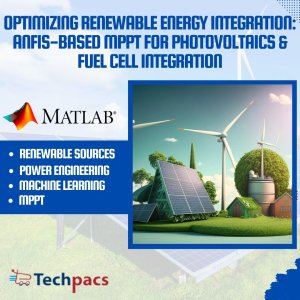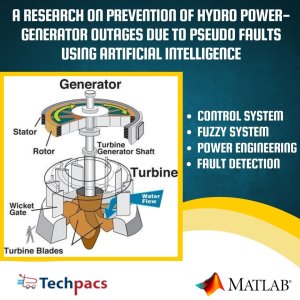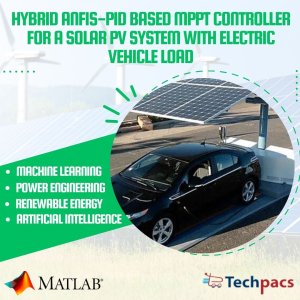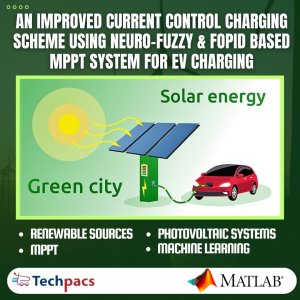Maximizing Solar PV System Performance through Integrated FOPID and PID Controllers with MPPT Algorithm for Efficient Power Management
Problem Definition
The current problem in charging electric vehicles (EVs) from the power grid leads to increased load demand and higher power bills for EV owners, necessitating the use of alternate sources of electricity. Charging EV batteries with renewable energy sources such as sunlight and wind can help reduce this load and promote sustainability. However, existing methods, like the off-board system developed by researchers in [18], face limitations such as fluctuations in results and inefficiencies in power extraction from solar panels. The control techniques employed in these systems are also deemed ineffective due to the use of converters and voltage controllers. These challenges highlight the need for a novel and efficient approach to charging EVs with solar power, emphasizing the significance of developing a more effective system to meet the growing demands of sustainable transportation.
Objective
The objective is to develop an efficient and reliable electric vehicle (EV) charger powered by solar energy by implementing an improved charging strategy. This involves using a Fractional Order PID (FOPID) controller instead of a PI controller, along with integrating Maximum Power Point Tracking (MPPT) techniques to optimize power generation from solar panels. By addressing the limitations of existing systems and enhancing performance, the goal is to contribute towards more sustainable and cost-effective EV charging solutions.
Proposed Work
To address the issues surrounding EV battery charging with renewable energy sources, particularly solar power, this project aims to implement an improved charging strategy. Building upon previous research that highlighted fluctuations in performance and the need for better power extraction from solar panels, this project will utilize a Fractional Order PID (FOPID) controller instead of a PI controller for enhanced charger performance. Additionally, Maximum Power Point Tracking (MPPT) techniques will be integrated into the system to optimize power generation from solar panels. By combining the FOPID controller and MPPT techniques, this project seeks to create an efficient and reliable EV charger powered by solar energy. The rationale behind these choices lies in the desire to address the shortcomings of existing charging systems and increase the effectiveness of using renewable energy sources for charging electric vehicles.
Through these improvements, the project aims to contribute towards a more sustainable and cost-effective charging solution for EV owners.
Application Area for Industry
This project can be utilized in various industrial sectors such as transportation, renewable energy, and electronics. In the transportation sector, the proposed solutions can help electric vehicle owners reduce their power bills by charging their vehicles with renewable energy sources like solar power. This will not only lower costs for the EV owners but also contribute to a cleaner environment by reducing the reliance on fossil fuels. In the renewable energy sector, implementing the FOPID controller and MPPT technique can improve the efficiency of solar energy systems, leading to increased power generation and better utilization of renewable resources. Additionally, in the electronics industry, the updated control strategy can be applied to improve the performance of charging systems for various electronic devices, enhancing their reliability and efficiency.
Overall, the benefits of implementing these solutions include cost savings, reduced environmental impact, and improved system performance across different industrial domains.
Application Area for Academics
The proposed project can enrich academic research in the field of renewable energy integration and electric vehicle charging systems. By addressing the limitations of previous research and introducing new technologies such as the Fractional Order PID controller and Maximum Power Point Tracking (MPPT) technique, the project aims to improve the efficiency and reliability of solar-powered EV chargers.
Educationally, this project can provide valuable insights and hands-on experience for students studying electrical engineering, renewable energy systems, and control systems. By implementing the proposed algorithms and control strategies in simulations or real-world experiments, students can gain practical knowledge in designing and optimizing sustainable charging solutions for electric vehicles.
Furthermore, researchers in the field of power electronics and renewable energy integration can use the code and literature generated from this project to further advance their studies.
MTech students and PhD scholars can leverage the findings and methodologies of this project for their own research work, exploring new possibilities for enhancing the performance of solar-powered EV charging systems.
Future scope of this project may include exploring alternative renewable energy sources for EV charging, such as wind or hydroelectric power, and optimizing the overall energy management system for a more sustainable and efficient operation. Additionally, the application of advanced machine learning algorithms or predictive modeling techniques could be integrated into the charging strategy to further improve energy efficiency and grid integration.
Algorithms Used
FOPID: The Fractional Order PID (FOPID) controller is used to replace the traditional PI controller in order to improve the performance of the charger. It offers more flexibility and robustness in adjusting control parameters, which can lead to better efficiency and accuracy in the charging process.
PID: The Proportional-Integral-Derivative (PID) controller is a widely used control algorithm that helps in maintaining a stable and precise control of the charging process. It provides a good balance between response time and stability by adjusting the control output based on the error, integral error, and derivative error.
PI: The Proportional-Integral (PI) controller is a simpler version of the PID controller and is commonly used in control systems.
In this project, it is being replaced by the FOPID controller to overcome the faults identified in previous research and improve the overall performance of the charger.
MPPT: The Maximum Power Point Tracking (MPPT) algorithm is used to track and extract the maximum power available from the solar panel. By using this technique in conjunction with the FOPID controller, the proposed system aims to efficiently utilize solar energy for charging electric vehicles, thus enhancing the overall efficiency of the charging process.
Overall, the integration of these algorithms in the proposed system will contribute to achieving the project's objectives of developing an effective and reliable EV charger using solar energy. The FOPID controller and MPPT technique will work together to enhance accuracy, improve efficiency, and address the identified faults from previous research, resulting in a more advanced and optimized charging strategy.
Keywords
SEO-optimized keywords: Renewable energy, EV batteries, solar power charging, power grid, load demand, electric vehicle charger, MPPT technique, FOPID controller, solar PV panels, energy efficiency, power generation, hybrid energy system, sustainable energy, power electronics, energy transfer, photovoltaic systems, battery bank, electric vehicle charging, energy utilization.
SEO Tags
Charging EV batteries, Renewable Energy Sources, Solar Power, Wind Power, Off-board Charging Systems, Sepic Converter, BIDC, Electric Vehicle Charger, Maximum Power Point Tracking, MPPT Technique, FOPID Controller, PID Controller, Energy Efficiency, Hybrid Energy System, Power Electronics, Energy Transfer, EV Charging Strategy, Sustainable Energy, Photovoltaic Systems, Battery Bank, Power Generation Optimization.
| Shipping Cost |
|
No reviews found!

















































No comments found for this product. Be the first to comment!